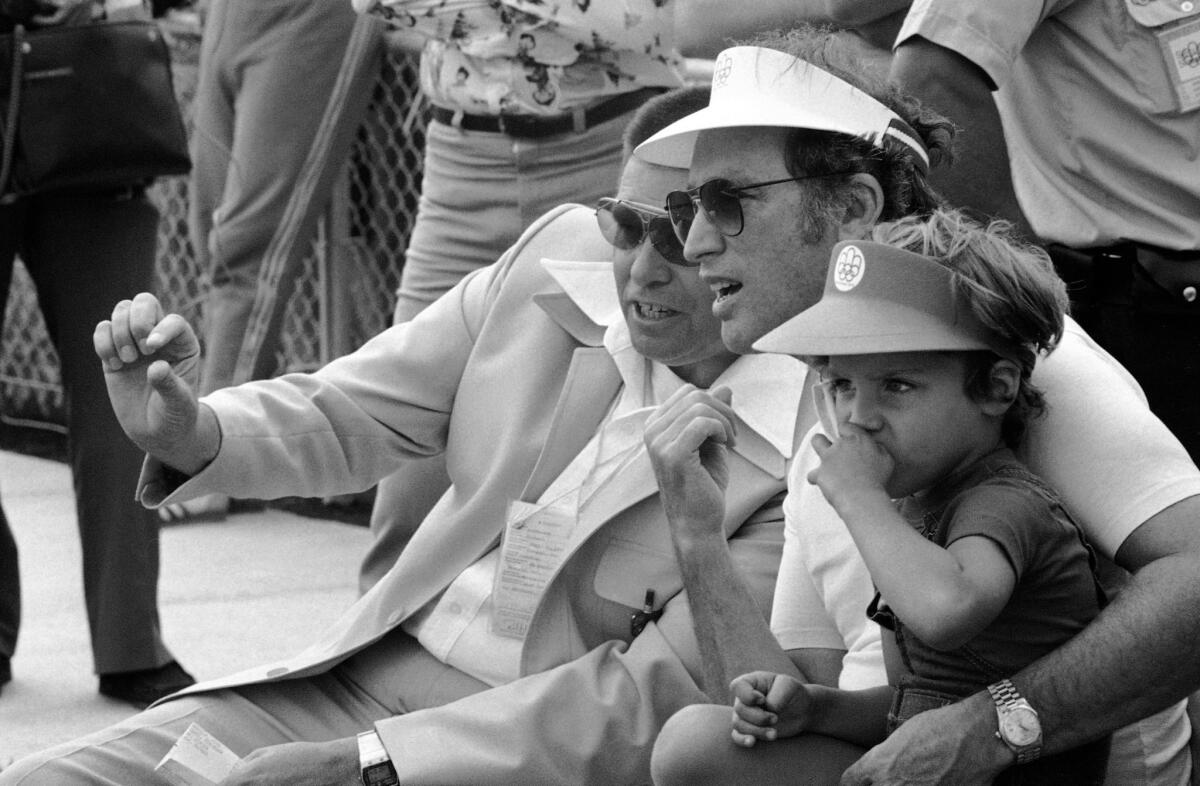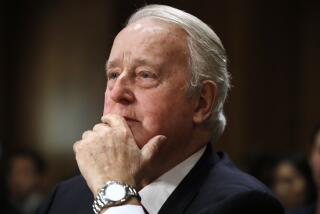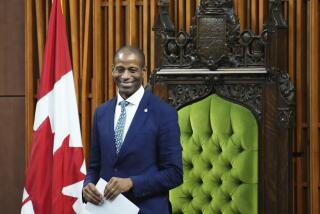From the Archives: Charismatic, controversial ex-Canadian PM Pierre Trudeau dies: ‘He was towering in the way FDR was towering’

Gil Henderson, left, manager of the Olympic shooting range in Montreal, talks with Canadian Prime Minister Pierre Trudeau, sitting in the stands with his son, Justin, on July 23, 1976.
Pierre Elliott Trudeau, the charismatic and controversial former prime minister of Canada whose vision inspired Canadians to reexamine their national character and reinvent their government, died Thursday in Montreal, his family announced. He was 80.
Trudeau had been suffering from prostate cancer and Parkinson’s disease, the family’s statement said. Canada’s national television network immediately cut away from its live coverage of the Olympics after the announcement to report extensively on Trudeau’s life and death. Accolades poured in from political allies and adversaries alike.
“The forces of change that he set in motion continue to shape the soul of his people,” Prime Minister Jean Chretien said of his mentor. “ . . . On the international stage, he gave us a profile and stature well beyond our size and power.”
SIGN UP for the free Essential Politics newsletter >>
In Washington, President Clinton noted Trudeau’s passing in a written statement:
“As prime minister for nearly a generation, Pierre Trudeau opened a dynamic new era in Canadian politics and helped establish Canada’s unique imprint on the global stage.”
Trudeau streaked to political prominence amid the kind of frenzy usually reserved for rock stars and was lifted into Canada’s highest office in 1968 on the crest of “Trudeaumania.” For most of the next 16 years, he dominated his country’s politics and pirouetted across the world diplomatic stage.
He revised the Canadian Constitution and vastly expanded his countrymen’s civil rights, built a European-style welfare state, crushed a violent separatist movement in his native province of Quebec and thrust himself into world affairs in a way that sometimes irritated occupants of the White House. His campaign to make Canada officially bilingual elevated the status of the country’s Francophone minority.
But Trudeau captured public imagination as much with his insouciant style as with his politics. He was witty, acerbic and irreverent, sliding down a banister at a meeting of world leaders at Buckingham Palace, waving his middle finger at protesting constituents and inviting John Lennon and Yoko Ono to his office in Ottawa.
An urbane, high-living bachelor into his 50s, Trudeau drove sports convertibles and dated actresses Barbra Streisand and Margot Kidder. In 1971, he married Margaret Sinclair, a beautiful free spirit who was nearly 30 years his junior. The marriage produced three sons and inspired a play still performed in Canada. But it ended badly amid Margaret Trudeau’s tabloidesque adventures with the Rolling Stones and others.
By the time he left office in 1984, Trudeau’s policies and pugnacious personality had worn away the adulation. Time also has eroded much of his legacy. The welfare state he nurtured proved ruinously expensive and has been pared back by his successors. The French language is seldom heard in much of the country. The arms-length relationship Trudeau favored with the United States has given way to the full embrace of the North American Free Trade Agreement.
Nonetheless--and despite a post-political career that mostly eschewed public attention--he remained a figure of influence and fascination until his death. In the early 1990s, Trudeau’s personal opposition helped defeat proposed changes to the Canadian Constitution that he believed conceded too much to the Quebec nationalists who were his lifelong bete noire. When Michel, the youngest of his three sons, died in an avalanche in 1998, the nation mourned with him.
In 1999, he dominated polls on the most important Canadians of the 20th century.
“Pierre Trudeau was simply a superior person,” said Michael Bliss, a University of Toronto professor and leading political historian. “He had a quality of integrity and leadership that is rare in the history of any country. . . . He was towering in the way FDR was towering.”
“He was the modern politician par excellence for Canadians . . . the beau ideal,” added historian J. L. Granatstein, co-editor of a 1998 book of essays on Trudeau’s legacy.
And yet, after more than 80 years crowded with political intrigue, intellectual challenge, physical exertion and romantic passion often played out in public, Trudeau remained at core an enigma, even to those closest to him.
“He’s a very distant man,” Trudeau’s son Sacha told a television reporter in 1999. “He’s private, even from our perspective. I guess he’s had kind of a lonely life, you know.”
A Childhood That Was Cosmopolitan
Pierre Elliott Trudeau was born Oct. 18, 1919, in Montreal to Charles-Emile Trudeau, a boisterous, hard-drinking French-Canadian entrepreneur, and the reserved, disciplined Grace Elliott Trudeau, who came from an English-speaking Quebec family of Scottish ancestry.
The bilingual and bicultural household--and the wealth accumulated by his father’s successful investments in gas stations, the Montreal Royals minor league baseball team and other enterprises--provided him with a cosmopolitan childhood.
His collegiate training spanned four nations on two continents: a law degree from the University of Montreal, a master’s from Harvard and graduate work at the Sorbonne in Paris and the London School of Economics.
Trudeau’s early career as lawyer, law professor, writer, labor activist and sometime government official blossomed during Quebec’s so-called Quiet Revolution, when the province was transformed from a largely rural society dominated by an English-speaking economic elite, a xenophobic Francophone political establishment and a rigidly conservative Roman Catholic Church into a pluralistic, secular and more egalitarian province.
Trudeau won a seat in the Canadian Parliament as a Liberal Party candidate in 1965 and almost immediately was brought into the government of Prime Minister Lester B. Pearson. Named justice minister in 1967, he created a sensation by declaring that “the state has no place in the bedrooms of the nation” and liberalizing laws on divorce, abortion and homosexuality.
A year later, he stood for election as prime minster on a platform promising a “Just Society.” Canada--and much of the rest of the world--fell in love with him.
In Europe, it was the era of the Beatles and swinging London, and in the U.S. there was Haight-Ashbury and the “Summer of Love.” But Canada retained a reputation as a somber and cold political and cultural backwater. Trudeau was seen as the antidote for all that--young, athletic, shrewd and sexy. He climbed mountains, canoed into the wilderness and did back flips off diving boards. Young women lined up for an autograph and a kiss on the cheek.
In his memoirs, Trudeau professed little understanding of “Trudeaumania” and shrugged it off as having more to do with the times than with him. But others suggest he carefully molded his image.
“Pierre understood . . . you live the part, but it is a part; it is an act,” Jim Coutts, a longtime aide, told Canadian television.
The image included regular canoe expeditions into the Arctic. Craig Oliver, an Ottawa television journalist who went on several of those trips, recalled one on the Hanbury River in which Trudeau beached his canoe and charged a pack of five grizzly bears, chasing them up a hillside.
“I went chasing him,” Oliver recalled. “I had an old gun in my pack and I brought it with me. Grizzly bears, you know, can be quite dangerous. When I finally caught up with him, all out of breath, I kind of berated him, saying he could have put a lot of people in danger . . .
“He asked me, ‘How many bullets do you have in the gun?’ I said, ‘Six.’ He said, ‘Well, there were only five bears.’ That was his idea of a joke. But it was also typical of his courage, in politics and everything else.”
Swift Invocation of War Measures Act
Trudeau’s first critical test in office came in October 1970, when the Front de Liberation de Quebec, or FLQ, a violent splinter group of separatists, kidnapped British diplomat James Cross and Quebec Cabinet minister Pierre LaPorte.
Trudeau swiftly invoked the War Measures Act, giving the government extraordinary powers of arrest, detention and censorship. With the army posted at strategic intersections in Montreal and Ottawa, authorities rounded up nearly 500 suspected dissidents, leftists and separatist sympathizers.
Trudeau was scornful of those who suggested he had overreacted.
“There’s a lot of bleeding hearts around who just don’t like to see people with helmets and guns,” he told reporters. “All I can say is go ahead and bleed. It’s more important to keep law and order in society.”
When a newsman asked him how far he was prepared to go, Trudeau replied, “Just watch me.”
LaPorte turned up dead in the trunk of a car, but Cross eventually was released. While some terrorists were given passage to Cuba, LaPorte’s killers were captured and tried. The FLQ was broken up.
Trudeau’s actions remain controversial, but the consensus today is that he did what was necessary.
“It was overkill, but there’s no question it was a success,” Stephen Clarkson, co-author of a two-volume Trudeau biography said in an interview. “He resolved a very tense situation with very little loss of life. . . . And the separatist movement then completely rejected violence.”
Though twice reelected, the constant controversies, a declining economy and a penchant for involving the government in social experimentation gradually took a toll on Trudeau’s support.
Meanwhile, his marriage collapsed in 1977 amid a parade of spectacularly public indiscretions by Margaret Trudeau, fueled, she would later admit, by drugs. The couple divorced in 1984 and he was awarded custody of their boys, Justin, Sacha and Michel.
Canada’s voters registered their estrangement from Trudeau by expelling him from office in the 1979 elections. But in a stunning turnaround aided by the bumbling of his opponents, Trudeau won a new election just nine months later and reassumed the prime minister’s office as a new crisis dawned in Quebec.
Rene Levesque, the separatist leader elected provincial premier of Quebec in 1976, was the only Canadian politician to rival Trudeau in charisma. In an effort to resolve the separatist issue once and for all, Levesque called a province-wide vote on secession in 1980.
During the campaign leading up to the vote, Trudeau’s passionate defense of Canadian unity was credited with turning what had been considered a close election into a rout, with Quebecers repudiating sovereignty by a margin of 60% to 40%.
With the separatists in retreat, Trudeau pressed ahead with a bold plan for constitutional reform. Although Canada had peacefully ended its colonial relationship with Britain in 1867, the country’s basic law was still an act of the British Parliament. In 1982 he returned the constitution to Canada and added the Charter of Rights and Freedoms, his most far-reaching achievement.
The charter, patterned after the U.S. Bill of Rights, has significantly expanded individual civil rights, strengthened the collective rights of Native American tribes, women, gays and ethnic minorities and shifted political power from Parliament to the Supreme Court.
“The charter has changed our politics and public life dramatically and permanently; it’s become an iconic document,” said historian Granatstein. “ . . . It Americanized our system.”
Not that Trudeau sought to emulate much about the United States. While maintaining generally good relations with the U.S., he became particularly adept at “plucking the eagle’s feathers” as Granatstein put it. Trudeau welcomed American draft dodgers to Canada during the Vietnam War; maintained friendly relations with Cuba, socializing with Fidel Castro in Havana; and extended recognition to mainland China before the U.S. did.
On Feb. 29, 1984, after warnings by advisors that he had overstayed his welcome with voters, Trudeau retired from politics.
Classical guitarist Liona Boyd, who was Trudeau’s companion for eight years after his separation from Margaret, said Thursday that he turned aside potential appointments to the United Nations and government organizations so he could be a full-time father.
“I know firsthand what a devoted father he was,” said Boyd, who now lives in Los Angeles. “The boys came first, transcendent above everything else.”
Like many American presidents, Trudeau’s approval ratings rose after his retirement, except in Quebec. The nation seemed delighted in 1991 when newspapers reported that at age 71 he had again become a father, this time to a girl, Sarah Elizabeth. The mother was Deborah Coyne, a 36-year-old constitutional lawyer to whom Trudeau was not married. When Trudeau’s memoirs were published in 1993, critics dismissed them as tepid and superficial, but Canadians made the book a bestseller.
Historian Bliss summed up his enduring appeal this way: “You’d tell your children, ‘I want you to be like Pierre Trudeau when you grow up.’ Try that out on any of today’s politicians.”
There was no immediate announcement of funeral plans.
Turner was The Times’ Toronto bureau chief from 1994 through 1998.
More to Read
Start your day right
Sign up for Essential California for the L.A. Times biggest news, features and recommendations in your inbox six days a week.
You may occasionally receive promotional content from the Los Angeles Times.






